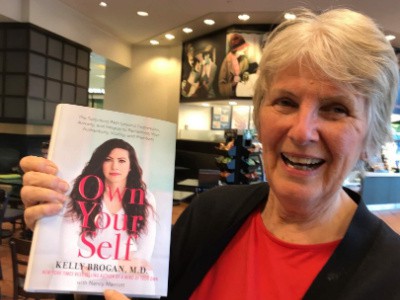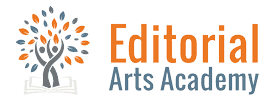For over twenty-five years, I’ve been a developmental editor of nonfiction. But recently, I’ve added “book coaching” to my editorial services.
The shift came about when Dr. Kelly Brogan, a holistic psychiatrist with a bestseller under her belt, contacted me to help with her second book. I originally signed on as a developmental editor, but it quickly became clear she needed organizational clarity to get that first draft written, calling for book coaching rather than developmental editing.
Once we made it to the end of draft one, I continued with Kelly as her developmental editor. Some months later, I had the thrill of walking into my local Barnes & Noble and seeing the book I helped birth on the front table: Own Your Self: The Surprising Path beyond Depression, Anxiety, and Fatigue to Reclaiming Your Authenticity, Vitality, and Freedom, published by Hay House in November 2019. And my name was right there on the cover as coauthor!

Nancy Marriott holds the book she coauthored with Kelly Brogan through a book coaching/developmental editing collaboration.
Full disclosure: It’s unusual for developmental editors to be credited on the front cover, but when an editor also provides coaching—which is what I did—some authors will consider them a coauthor.
If you’re a developmental editor who’s interested in expanding your services to book coaching, like I have done, this post is for you. Read on!
Part Developmental Editor, Part Book Coach
Working almost exclusively with nonfiction authors, I’ve observed that there’s a great deal of overlap: book coaching often involves elements of developmental editing, and developmental editing often includes elements of coaching. But by distinguishing the two, instead of collapsing them into the catchall category of “developmental editing,” you can show your clients added value—and get paid for it.
Here’s an overview of the two distinct roles: developmental editor and book coach.
Book Coach
Editors act in this role when an author needs ongoing support to go from initial idea to fully developed first draft of a manuscript. After the coach guides the author to complete a book, the manuscript still needs to undergo the full editorial process. Book coaching is perhaps more commonly needed in nonfiction genres, particularly when authors haven’t studied writing before, but fiction authors also use book coaches. Initial material provided can be a collection of blogs, journal entries, character studies, or outlines. Book coaches often meet regularly with authors to review their work and keep them on track.
Developmental Editor
The developmental editor works on a finished manuscript that needs revision. The editor provides detailed feedback in an editorial letter, and also goes into the text to provide chapter-by-chapter commentary. Some developmental editors, especially of fiction, also create a book map. The developmental editor asks probing questions, makes suggestions, moves pieces around, or simply says, “Great job here.” Their work might take place over more than one round.
To be clear, the kind of coaching I’m talking about is distinct from writing coach or publishing coach. Both of these other roles can be invaluable to authors, but a book coach, as I’m discussing it, helps the author develop the content of their books, not improve their prose or sign an agent.
How to Make the Shift from Developmental Editor to Book Coach
Here’s what it takes to expand developmental editing services to include book coaching.
1. Know What the Job Is
When an author comes to you asking for help developing their materials into a book, and they don’t have a manuscript but rather a series of blogs or short writings, it’s a signal that the job is going to call for more than a developmental edit. Although authors in this position could probably benefit from the services of a ghostwriter, this is too pricey for many. Instead, you can offer to help them write the book, giving you that additional role of book coach.
To do that, they will need you to help them assemble their material into a first draft, when you can begin to call it a “manuscript.” This may involve:
- reading all materials the author has gathered so far (blog posts, letters, scrawls on the back of a napkin)
- collaborating with the author to create a grand vision for the book
- interviewing them to help elicit additional book material
- meeting with the author regularly to review progress, tackle challenges, and listen to their concerns and fears
- sending them assignments (click here to download an example of a book coaching assignment)
- keeping them on track with an editorial schedule
Be careful: Now is not the time to help your client craft gorgeous prose or tie it all together with elegant “connective tissue.” Rather, during the coaching stage, you’re suggesting additional material for areas that are undeveloped or recommending cuts that will keep the author’s message front and center. The focus is not on language, but on content and structure.
2. Sharpen Your Communication Skills
For any coaching relationship, clear, reliable, and positive communication is a must—and when you’re involved in a creative process such as writing, it’s even more important.
As a book coach, be clear about what your role is, and do so in timely, respectful emails. Encourage your author, and communicate that you are holding a vision for their book, even when they doubt that vision. This will help your client reach the finish line and create that first draft.
Recently I worked with an author in a book coaching capacity. A pattern developed: she would send me a chapter for feedback and I would begin the review, but before I could turn it around, I’d get a frantic email telling me to throw the chapter out because “it wasn’t any good.” I pointed out what I was observing and asked her to let go of her inner critic and give me a chance. I assured her that if the chapter “wasn’t any good,” I’d let her know. She agreed, and slowly she began to recognize her habit of abandoning her efforts so as to avoid judgment and criticism, something she’d suffered from in the past. As her trust in me grew, we reached a more workable back-and-forth, and she was able to stop agonizing and complete her book.
3. Cultivate Patience and Let Go of Expectations
In another project that called upon my coaching skills, I learned a valuable lesson about patience and expectations.
My client wanted to put a collection of her dad’s writings into a book for the grandkids. In his nineties, her dad had received a reprieve from a terminal medical diagnosis, and she wanted to give him this last gift. She originally thought of the project as simply a collection of his letters that she would publish as is. Then she discovered a trove of his deeper writings that stunned her with their inspiring content. She realized how much her father’s writing had shaped her own career path as an international charity cofounder. She asked me to read what she’d found and help her re-envision the book.
I took her on with the goal of organizing the writings into theme-oriented chapters, but it soon became apparent that the greater story had to include her own perspective of what turned out to be a remarkable relationship with her father. With my support, she began to put herself into the book, framing his writings in the context of her upbringing and his educational and theological mission.
This was clearly not the book she’d set out to write—or the one she’d asked me initially to edit. I was busy with other projects, and I considered telling her I didn’t have time to shoulder this more extensive level of work. But I agreed with her that this was the book that wanted to be written, and I decided to set aside my expectations and embrace a new vision, schedule, and scope of work.
The entire process took over three years, and we went for long stretches without communicating while she ran her foundation and studied her father’s files. But our patience paid off. Love, Norm: Dr. Norman D. Fintel on Equality and Courage in a World Calling for Change was self-published in 2019.
4. Be Willing to Tell the Unvarnished Truth (Respectfully!)
As an editor, you know that the author is, in the end, the final decision maker. You might repeatedly suggest changes that the author might not take.
But a coach needs to stand on firmer ground.
Authors can be fiercely attached to their book. But if you can’t see the vision they do, you may have to tell them to go back to the drawing board. This can be hard, and sometimes it can feel like a fight of sorts. But think of it less as a fight and more as your obligation to be a truth teller. The author is still crafting the book, so now is the time to have those conversations—not once the book is written. Of course, the author remains the final word, just as they are during developmental editing; but a book coach can have a far greater impact on the book’s structure, theme, and “story engine” than can a developmental editor.
5. Believe in, and Know About, Your Author’s Book
In your coaching capacity, you take on the role of champion for your author’s book. You need to believe in that book’s purpose, and its possibility, as much as they do—even more!
What about subject matter expertise? As an editor, it isn’t always necessary to be an expert in the subject matter. But as a coach, being knowledgeable about your author’s subject can help to build a stronger book.
My niche is wellness, health, personal growth, spirituality, and women’s issues, and I bring my expertise in those areas to my coaching recommendations. This can include ideas about the grand vision of the book, sources they might want to reference, or arguments they might not have considered. I’m also familiar with the market for such books and can help authors aim their content to specific target audiences.
Could You be a Book Coach?
I didn’t train to be a book coach, but I have been trained as a life coach, helping others in their personal and professional development. This has served me well in knowing how to support my clients.
It certainly doesn’t hurt to have some training as a life coach, but keep in mind that book coaching is a different animal. More than cheering people on (or skillfully kicking their butt!), book coaching involves giving guidance in the art and craft of writing a book, and that’s something that developmental editors know well how to do.
If you want to shift from developmental editing to book coaching, look into Jennie Nash’s program at Author Accelerator. There aren’t many places that offer a certified program in becoming a book coach, so if that’s what you want, that program is a great place to start.
To learn more about the different types of editing, what’s involved in each role, and where you most naturally fit, check out our self-paced course, Freelance Book Editing 101.



